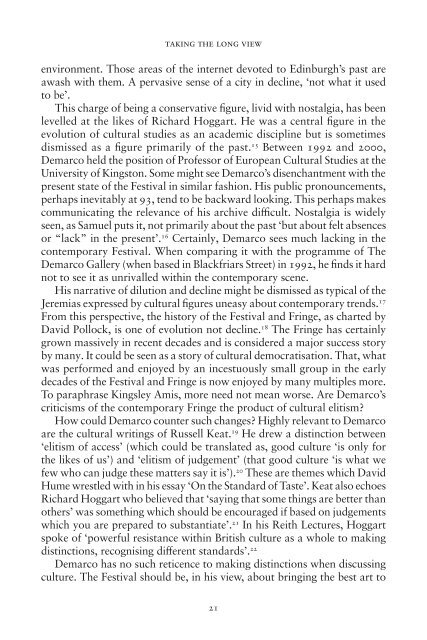Demarco's Edinburgh by Richard Demarco and Roddy Martine sampler
In this fascinating book, Richard – the 2013 UK recipient of the Citizen of Europe medal – explores the original world vision of Sir John Falconer and Rudolph Bing and, with Roddy, recalls the highs and lows of The Edinburgh International Festival, The Fringe, Art, Book, Jazz and Television Festivals, and The Royal Edinburgh Military Tattoo.
In this fascinating book, Richard – the 2013 UK recipient of the Citizen of Europe medal – explores the original world vision of Sir John Falconer and Rudolph Bing and, with Roddy, recalls the highs and lows of The Edinburgh International Festival, The Fringe, Art, Book, Jazz and Television Festivals, and The Royal Edinburgh Military Tattoo.
Create successful ePaper yourself
Turn your PDF publications into a flip-book with our unique Google optimized e-Paper software.
Taking the Long View<br />
environment. Those areas of the internet devoted to <strong>Edinburgh</strong>’s past are<br />
awash with them. A pervasive sense of a city in decline, ‘not what it used<br />
to be’.<br />
This charge of being a conservative figure, livid with nostalgia, has been<br />
levelled at the likes of <strong>Richard</strong> Hoggart. He was a central figure in the<br />
evolution of cultural studies as an academic discipline but is sometimes<br />
dismissed as a figure primarily of the past. 15 Between 1992 <strong>and</strong> 2000,<br />
<strong>Demarco</strong> held the position of Professor of European Cultural Studies at the<br />
University of Kingston. Some might see <strong>Demarco</strong>’s disenchantment with the<br />
present state of the Festival in similar fashion. His public pronouncements,<br />
perhaps inevitably at 93, tend to be backward looking. This perhaps makes<br />
communicating the relevance of his archive difficult. Nostalgia is widely<br />
seen, as Samuel puts it, not primarily about the past ‘but about felt absences<br />
or “lack” in the present’. 16 Certainly, <strong>Demarco</strong> sees much lacking in the<br />
contemporary Festival. When comparing it with the programme of The<br />
<strong>Demarco</strong> Gallery (when based in Blackfriars Street) in 1992, he finds it hard<br />
not to see it as unrivalled within the contemporary scene.<br />
His narrative of dilution <strong>and</strong> decline might be dismissed as typical of the<br />
Jeremias expressed <strong>by</strong> cultural figures uneasy about contemporary trends. 17<br />
From this perspective, the history of the Festival <strong>and</strong> Fringe, as charted <strong>by</strong><br />
David Pollock, is one of evolution not decline. 18 The Fringe has certainly<br />
grown massively in recent decades <strong>and</strong> is considered a major success story<br />
<strong>by</strong> many. It could be seen as a story of cultural democratisation. That, what<br />
was performed <strong>and</strong> enjoyed <strong>by</strong> an incestuously small group in the early<br />
decades of the Festival <strong>and</strong> Fringe is now enjoyed <strong>by</strong> many multiples more.<br />
To paraphrase Kingsley Amis, more need not mean worse. Are <strong>Demarco</strong>’s<br />
criticisms of the contemporary Fringe the product of cultural elitism?<br />
How could <strong>Demarco</strong> counter such changes? Highly relevant to <strong>Demarco</strong><br />
are the cultural writings of Russell Keat. 19 He drew a distinction between<br />
‘elitism of access’ (which could be translated as, good culture ‘is only for<br />
the likes of us’) <strong>and</strong> ‘elitism of judgement’ (that good culture ‘is what we<br />
few who can judge these matters say it is’). 20 These are themes which David<br />
Hume wrestled with in his essay ‘On the St<strong>and</strong>ard of Taste’. Keat also echoes<br />
<strong>Richard</strong> Hoggart who believed that ‘saying that some things are better than<br />
others’ was something which should be encouraged if based on judgements<br />
which you are prepared to substantiate’. 21 In his Reith Lectures, Hoggart<br />
spoke of ‘powerful resistance within British culture as a whole to making<br />
distinctions, recognising different st<strong>and</strong>ards’. 22<br />
<strong>Demarco</strong> has no such reticence to making distinctions when discussing<br />
culture. The Festival should be, in his view, about bringing the best art to<br />
21


















